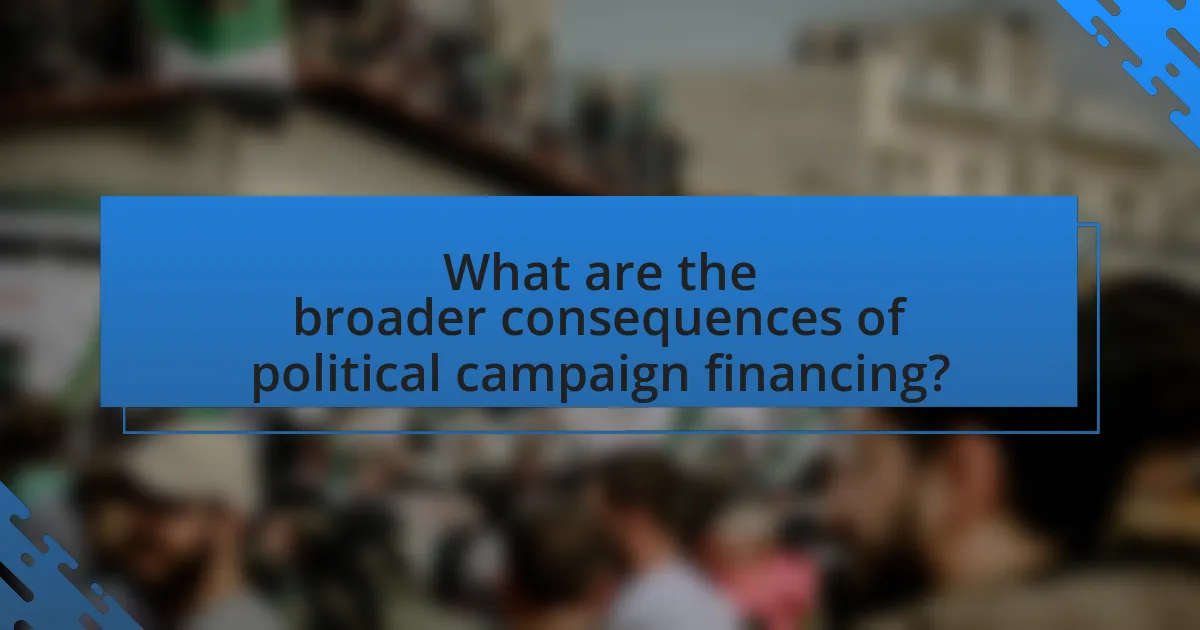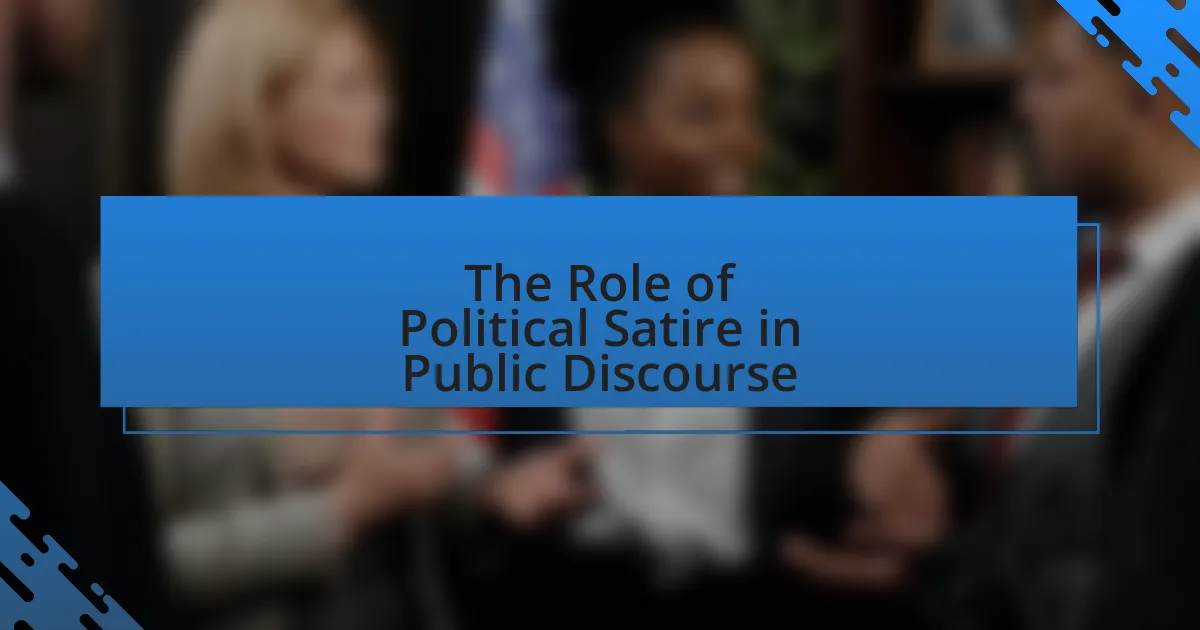The article examines the dynamics of political campaign financing and its consequences, focusing on key components such as contributions, expenditures, and fundraising strategies. It highlights the impact of different funding sources on candidate visibility, policy priorities, and electoral outcomes, emphasizing the significant role of individual contributions and Political Action Committees (PACs). The article also discusses federal and state regulations governing campaign financing, the correlation between funding levels and electoral success, and the broader implications for democratic processes and governance. Additionally, it addresses ethical considerations, transparency, and best practices for ensuring fair campaign financing.

What are the key components of political campaign financing?
The key components of political campaign financing include contributions, expenditures, and fundraising strategies. Contributions refer to the financial donations made by individuals, organizations, or political action committees (PACs) to support a candidate or party. Expenditures encompass the spending on campaign activities such as advertising, staff salaries, and events. Fundraising strategies involve the methods used to gather financial support, including events, online donations, and direct mail campaigns. According to the Federal Election Commission, in the 2020 U.S. elections, candidates raised over $14 billion, highlighting the significant role of these components in shaping campaign dynamics.
How do different sources of funding impact political campaigns?
Different sources of funding significantly impact political campaigns by influencing candidate visibility, policy priorities, and electoral outcomes. For instance, candidates funded by large donations from corporations or wealthy individuals often prioritize the interests of those donors, which can lead to policies favoring specific industries. Research from the Center for Responsive Politics shows that in the 2020 U.S. elections, candidates who raised more than $1 million were more likely to win their races, highlighting the correlation between funding levels and electoral success. Additionally, grassroots funding sources, such as small donations from individual supporters, can enhance a candidate’s appeal by demonstrating broad public support, as seen in the campaigns of figures like Bernie Sanders, who raised significant amounts through small contributions. Thus, the source of funding shapes not only the financial viability of campaigns but also the political landscape and policy decisions made by elected officials.
What roles do individual contributions play in campaign financing?
Individual contributions are crucial in campaign financing as they provide essential funding that candidates rely on to support their electoral activities. These contributions can significantly influence a candidate’s ability to reach voters through advertising, events, and outreach efforts. For instance, according to the Federal Election Commission, individual contributions accounted for approximately 60% of total campaign financing in the 2020 election cycle, highlighting their importance in shaping campaign strategies and outcomes.
How do Political Action Committees (PACs) influence funding?
Political Action Committees (PACs) influence funding by collecting and distributing contributions to candidates, parties, and political causes. PACs serve as a mechanism for individuals and organizations to pool resources, thereby amplifying their financial impact on political campaigns. For instance, in the 2020 election cycle, PACs contributed over $1.5 billion to candidates, significantly shaping electoral outcomes. This financial support often comes with expectations of political favors or alignment with specific agendas, illustrating the reciprocal relationship between PAC funding and political influence.
What regulations govern political campaign financing?
Federal regulations governing political campaign financing in the United States are primarily established by the Federal Election Commission (FEC) under the Federal Election Campaign Act (FECA). These regulations include limits on individual contributions to candidates, disclosure requirements for campaign financing sources, and provisions for public funding of presidential elections. For instance, individuals can contribute a maximum of $2,900 per election to a candidate, as adjusted for inflation. Additionally, the Bipartisan Campaign Reform Act (BCRA) of 2002 further restricted the use of soft money in federal elections, aiming to reduce the influence of large donations on political outcomes. These regulations are enforced to promote transparency and fairness in the electoral process.
How do federal laws shape campaign finance practices?
Federal laws significantly shape campaign finance practices by establishing regulations on contributions and expenditures in political campaigns. The Federal Election Commission (FEC) enforces these laws, which include limits on individual contributions to candidates, prohibitions on foreign contributions, and requirements for transparency in campaign financing. For instance, the Bipartisan Campaign Reform Act of 2002 aimed to reduce the influence of money in politics by banning soft money contributions to national parties and imposing stricter rules on the disclosure of campaign finance information. These regulations are designed to promote fairness and accountability in the electoral process, ensuring that voters are informed about the sources of campaign funding.
What are the implications of state-level regulations on campaign financing?
State-level regulations on campaign financing significantly impact the political landscape by shaping the flow of money into campaigns. These regulations can limit contributions from individuals and organizations, thereby reducing the influence of wealthy donors and special interest groups on elections. For instance, states like California and New York have implemented strict contribution limits, which can lead to a more equitable playing field among candidates. Additionally, such regulations often require greater transparency in campaign financing, compelling candidates to disclose their funding sources, which can enhance public trust in the electoral process. Research indicates that states with stringent campaign finance laws tend to experience lower levels of corruption and increased voter engagement, as citizens feel their voices are more likely to be heard in a system less dominated by money.

How does political campaign financing affect electoral outcomes?
Political campaign financing significantly influences electoral outcomes by determining the resources available for candidates to promote their messages and engage with voters. Candidates with higher financial backing can afford extensive advertising, outreach efforts, and campaign infrastructure, which often leads to increased visibility and voter recognition. For instance, in the 2020 U.S. presidential election, Joe Biden and Donald Trump raised over $1 billion each, allowing them to dominate media coverage and voter engagement strategies. Research indicates that candidates who outspend their opponents typically receive a higher percentage of the vote, as evidenced by a study from the Center for Responsive Politics, which found that candidates who spent more than their opponents won approximately 80% of the time in competitive races. Thus, the correlation between campaign financing and electoral success is well-documented, highlighting the critical role of financial resources in shaping electoral outcomes.
What is the relationship between campaign spending and election results?
Campaign spending significantly influences election results, with higher expenditures generally correlating with increased voter support. Research indicates that candidates who spend more on their campaigns tend to gain greater visibility and name recognition, which can lead to higher polling numbers. For instance, a study by the Center for Responsive Politics found that in the 2020 U.S. elections, candidates who outspent their opponents won approximately 90% of the time in competitive races. This demonstrates a clear relationship where increased financial resources enhance a candidate’s ability to communicate their message and mobilize voters effectively.
How does increased funding correlate with candidate success?
Increased funding significantly correlates with candidate success in political campaigns. Research indicates that candidates with higher financial resources can afford more extensive advertising, outreach, and campaign infrastructure, which enhances their visibility and voter engagement. For instance, a study by the Center for Responsive Politics found that candidates who raised over $1 million were more likely to win their elections, with a success rate exceeding 70% in competitive races. This demonstrates that financial backing not only facilitates campaign activities but also influences voter perception and ultimately electoral outcomes.
What impact does spending have on voter perception and engagement?
Spending significantly influences voter perception and engagement by shaping the visibility and credibility of candidates. High campaign expenditures often lead to increased media coverage and advertising, which can enhance a candidate’s public image and perceived viability. Research indicates that candidates who spend more tend to receive higher levels of voter support; for instance, a study by the Center for Responsive Politics found that candidates who outspent their opponents by substantial margins often won their races. Additionally, increased spending can mobilize voters through targeted outreach efforts, thereby improving overall engagement in the electoral process.
Why do some candidates struggle despite high funding?
Some candidates struggle despite high funding due to ineffective campaign strategies and poor voter engagement. High financial resources do not guarantee success if candidates fail to connect with their target audience or communicate their message effectively. For instance, a study by the Pew Research Center found that voter perception and candidate relatability significantly influence election outcomes, often more than financial backing. Additionally, candidates may face challenges such as internal campaign mismanagement or lack of a clear platform, which can undermine their ability to utilize funds effectively.
What factors beyond financing contribute to electoral success?
Electoral success is influenced by several factors beyond financing, including candidate charisma, effective communication skills, grassroots mobilization, and voter engagement strategies. Charismatic candidates often attract more support due to their ability to connect with voters on a personal level, as seen in historical elections where personality played a crucial role, such as Barack Obama’s 2008 campaign. Effective communication skills enable candidates to articulate their policies clearly and resonate with the electorate, which is essential for building trust and credibility. Grassroots mobilization, involving local volunteers and community outreach, has proven effective in increasing voter turnout, as demonstrated by the success of campaigns that prioritize local engagement. Additionally, voter engagement strategies, such as targeted messaging and utilizing social media platforms, have become vital in reaching diverse demographics, further enhancing a candidate’s chances of electoral success.
How do campaign strategies interact with funding levels?
Campaign strategies are significantly influenced by funding levels, as higher funding allows for more extensive outreach, advertising, and voter engagement efforts. For instance, campaigns with substantial financial resources can afford to implement multi-channel marketing strategies, including television ads, digital campaigns, and grassroots mobilization, which enhance visibility and voter connection. A study by the Center for Responsive Politics found that candidates who spent more than $1 million on their campaigns were 10 times more likely to win their elections compared to those who spent less. This correlation illustrates that funding not only supports the execution of diverse strategies but also directly impacts electoral success.

What are the broader consequences of political campaign financing?
Political campaign financing significantly influences democratic processes and governance. It can lead to increased political inequality, as candidates with substantial financial backing often have greater access to media and resources, allowing them to dominate public discourse. This financial disparity can result in policies that favor wealthy donors over the general populace, undermining the principle of equal representation. For instance, a study by the Brennan Center for Justice found that candidates who spend more than their opponents are more likely to win elections, highlighting the correlation between funding and electoral success. Additionally, excessive reliance on large donations can foster corruption and diminish public trust in government, as citizens may perceive elected officials as beholden to their financial backers rather than their constituents.
How does campaign financing influence policy decisions post-election?
Campaign financing significantly influences policy decisions post-election by creating a dependency on financial backers for political leaders. Once elected, officials often prioritize the interests of their major donors, which can lead to the enactment of policies that favor specific industries or groups over the general public. For instance, research by the Center for Responsive Politics indicates that candidates who receive substantial contributions from the pharmaceutical industry are more likely to support legislation that benefits that sector, such as drug pricing policies. This correlation demonstrates how financial contributions can shape legislative agendas and outcomes, ultimately affecting governance and public policy.
What role do donors play in shaping legislative agendas?
Donors significantly influence legislative agendas by providing financial support to political campaigns, which in turn affects the priorities and policies that elected officials pursue. This financial backing often leads to a reciprocal relationship where legislators feel compelled to align their legislative actions with the interests of their donors. For instance, research from the Center for Responsive Politics indicates that candidates who receive substantial contributions from specific industries tend to advocate for policies that favor those industries, demonstrating a direct correlation between donor influence and legislative outcomes.
How does the perception of corruption affect public trust in government?
The perception of corruption significantly undermines public trust in government. When citizens believe that government officials engage in corrupt practices, they are less likely to view their government as legitimate or effective. Research conducted by Transparency International indicates that countries with high levels of perceived corruption experience lower levels of public trust, as evidenced by their Corruption Perceptions Index scores correlating with trust in public institutions. This erosion of trust can lead to decreased civic engagement, lower voter turnout, and a general disillusionment with the political process, ultimately destabilizing democratic governance.
What are the ethical considerations surrounding campaign financing?
Ethical considerations surrounding campaign financing include transparency, equity, and the potential for corruption. Transparency is crucial as it ensures that voters are aware of who is funding campaigns, which can influence political agendas. Equity is a concern because unequal financial contributions can lead to disproportionate political influence, favoring wealthy donors over average citizens. The potential for corruption arises when large donations create conflicts of interest, where elected officials may prioritize the interests of their donors over the public good. For instance, the Supreme Court’s decision in Citizens United v. FEC (2010) allowed for unlimited corporate spending in elections, raising significant ethical questions about the integrity of democratic processes.
How do transparency and accountability impact public opinion?
Transparency and accountability significantly enhance public opinion by fostering trust in political institutions. When governments and organizations operate transparently, citizens are more likely to perceive them as legitimate and trustworthy. Research indicates that transparency reduces corruption perceptions, as seen in the 2018 Transparency International report, which found that countries with higher transparency scores tend to have lower levels of corruption and greater public trust. Furthermore, accountability mechanisms, such as audits and public reporting, empower citizens to hold leaders responsible for their actions, leading to increased civic engagement and satisfaction with governance. This relationship between transparency, accountability, and public opinion is crucial in shaping democratic processes and ensuring responsive governance.
What measures can be taken to ensure fair campaign financing practices?
To ensure fair campaign financing practices, implementing strict contribution limits is essential. These limits can prevent excessive influence from wealthy donors and special interest groups, promoting a more equitable political landscape. For instance, the Bipartisan Campaign Reform Act of 2002 established limits on individual contributions to candidates, which aimed to reduce the impact of money in politics. Additionally, enforcing transparency through mandatory disclosure of campaign contributions and expenditures allows voters to understand the financial backing of candidates, fostering accountability. Research indicates that transparency measures can lead to increased public trust in the electoral process, as seen in studies conducted by the Brennan Center for Justice.
What best practices can candidates adopt for ethical campaign financing?
Candidates can adopt transparency, accountability, and adherence to legal limits as best practices for ethical campaign financing. Transparency involves fully disclosing all sources of campaign contributions and expenditures, which fosters trust among voters and stakeholders. Accountability requires candidates to maintain accurate records of financial transactions and to report them regularly to relevant authorities, ensuring compliance with campaign finance laws. Adhering to legal limits on contributions prevents undue influence from wealthy donors and promotes a level playing field in elections. These practices are supported by regulations such as the Federal Election Commission guidelines in the United States, which mandate disclosure and limit contributions to safeguard the integrity of the electoral process.





